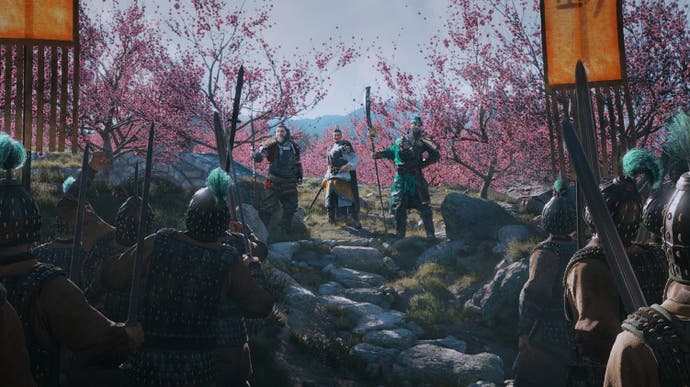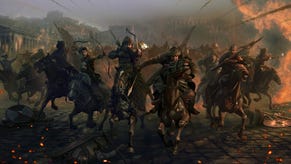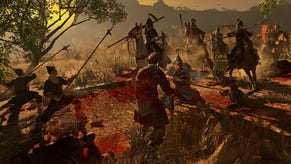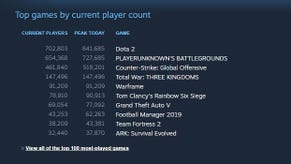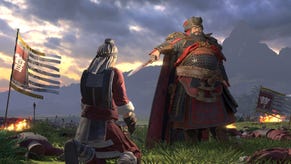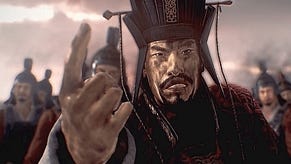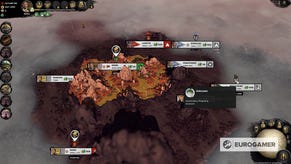Total War: Three Kingdoms review - can a game have too many big ideas?
Liu Bae.
Let me just say this: I am an absolute sucker for a big idea. A grand philosophy, or some big unifying theory of everything, that seeps under the skin and wraps around the bones of a game to tie it all together. Everything refers back to something else and informs it, all the dangling threads of design brought tidily back in line. Bliss. I love it. Very neat, very satisfying, very, very difficult to pull off.
Total War: Three Kingdoms is absolutely swimming in big ideas - plural - to its detriment and its strength, which is probably inevitable given the deeply, intrinsically philosophical era in which it's set. Three Kingdoms China starts with the fall of the Han Dynasty, around the late 100s to early 200s CE, and predictably it's a time of fractured alliances and political upheaval - so far so Total War. But it's also a time of mystery, and mythology, and romance, all intertwined with other capital-letter ideas like Confucianism and Wu Xing and Guanxi to make a big, slightly headache-inducing but vastly ambitious soup of design.
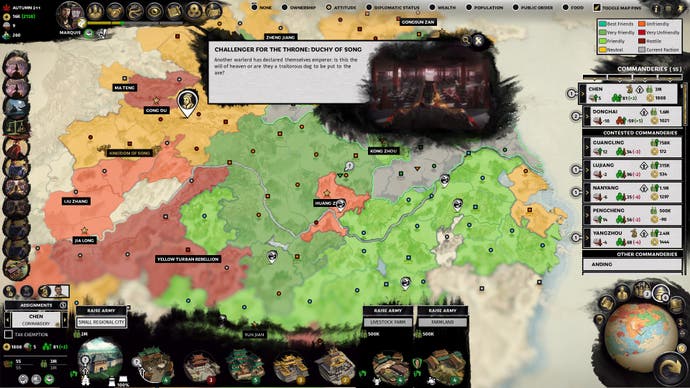
The one at the heart of it, though, is that trade-off, between a commitment to accuracy and the romanticised telling of the story that people are more likely to know. Creative Assembly has beaten the drum of Records-versus-Romance half to death by now but, if you weren't already aware, they're essentially two accounts of the period that can be reduced down to two books, Records of the Three Kingdoms and Romance of the Three Kingdoms, and the developer has - correctly - relied heavily on both.
That, of course, creates a bit of a dilemma. Total War fans are nothing if not fervent in their desire for accuracy, but a game based entirely on detailed accounts of regional taxation levies and nothing more might be just a little bland, even for them. More importantly it wouldn't be true to what that era actually is, if it missed out the romantic telling which gives it its form. Creative Assembly's admirably plaintive solution is to say "why not both?" and simply give the people what they want: two campaign modes. One's called Romance, and incorporates the details of the troops and economic systems - and of course taxation levies - with the narrative, catty, political intrigue of larger-than-life characters like Cao Cao and Dong Zhuo. The other is called Records (Anorak: Extra Dry Edition) which is for people who order their steak well done - hold the seasoning, thanks.
This might seem like an awful lot of time to spend talking about dusty books and grand chin-stroking without even getting into the game itself, but it is necessary. Three Kingdoms, I've come to realise, is a game that is utterly defined by its setting in time and in space - more so than any other Total War, and more than probably any other grand strategy or 4X game that I've played. The big ideas are webbed into absolutely everything - and there are so many things. They're responsible for some of its boldest decisions and some of its most vexing.
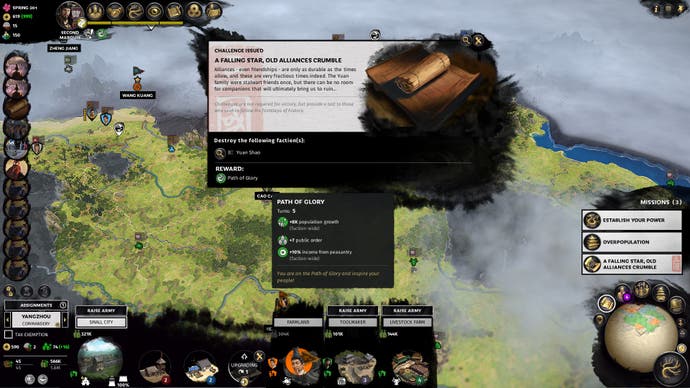
For my main playthrough I opted for a Romance mode campaign with Cao Cao, the strategic mastermind, because he along with Liu Bei feels like one of the two "main" factions pitched to you for a down-the-middle playthrough, and because I like to pretend I'm very intelligent. In most playthroughs, as I understand it, the big antagonist will be Dong Zhuo, a cruel but mighty leader who created a power vacuum in the toppling of the Han Emperor and leapt into it.
Only in my playthrough he died on about turn five.
Moments like this are one of the genuine joys of a Total War sandbox. Dong Zhuo's early death completely swung my campaign in a different direction. His faction was a pushover and instead my main antagonists were my allies, Yuan Shao and Liu Bei. Yuan Shao's penchant for vassalising everything in sight and Liu Bei's love of people who vassalise everything in sight made it impossible for me to compete for their friendship, and so, before I knew it, I was facing a vast alliance that covered almost half of the map, and was surrounded on all sides by a sea of friendly green. I usually like to play a pretty expansionist game in Total War - it is called Total War, after all - but I couldn't expand without turning half the world against me, and all the while the Yuan-Liu bromance is sweeping them towards the endgame goal of an Emperor's throne.
A lot of that might sound like standard Total War. Strong factions can get wiped out early, with a bit of luck, and strong alliances can of course be formed, but Three Kingdoms' influence on it is one of exacerbation. One of those capital-letter philosophies I mentioned, for instance, is Guanxi (in brief, a theory of interconnectedness) which informs the choices faction leaders make in-game, and the people-first ways in which they come about. Cao Cao has a unique ability to use "diplomatic manipulation" to make one faction like or dislike another, including himself, more or less. It's a slightly blunt tool, but it works: I built up some forces while everyone was chummy and then chipped away at friendships (there's a built-in cooldown to how often you can manipulate with Cao Cao, based on a slow-generating resource that governs its use), until I could pick off smaller vassals without both Yuan Shao and Liu Bei interfering.
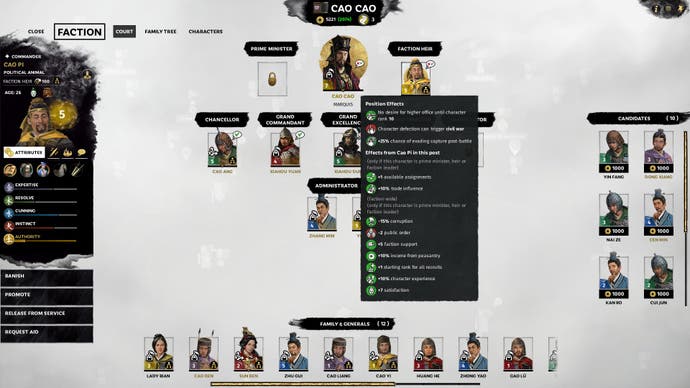
I've sent spies to check in on each of them, at the risk of betrayal. Characters that join your faction can be recruited as generals in armies, or behind-the-scenes administrators and court members, or spies, or a bit of all of them, and when they join they come with a history: factions they've served and left, opinions on leaders and characters, desires of their own, all of which could mean they're hardwired to love working for you or love stabbing you in the back when you least expect it. And they still could: I haven't finished my campaign yet, my big masterplan could still come rather dramatically undone - everyone seems to like my son more than me, which is making me nervous about a civil war - but I almost want it to fail, just to see how it'll play out.
The step up in historical understanding is the greatest achievement with Total War: Three Kingdoms.
It's the most sophisticated diplomacy system in a Total War game by some way, I think, right down to its more granular means of showing you an actual numerical value for what each side of a trade deal (people, items, money, and so on) is worth to one side or the other, so you can always work something out instead of working from a flat yes or no. And that sophistication and depth, and the way it's informed by an understanding of what that period meant, is just about everywhere in Three Kingdoms.
Where Guanxi is behind many AI characters' decisions, it's Wu Xing, a sort of five-elemental way of dividing things into categories, that's woven into the stats and attributes that inform your own. Wu Xing's slightly less successful than Guanxi, I think, playing out as a sort of five-way rock-paper-scissors for some things that don't always want to be put into such clean boxes. But it's a valiant effort. Characters, units, buildings, and tech tree bonuses are colour-coded according to their kind and are all intended to play off one another. A blue-tinged general is a Strategist - pair them with ranged units in your army, or market-and-school regions in your economy - Yellow makes for a good leader, and so on.
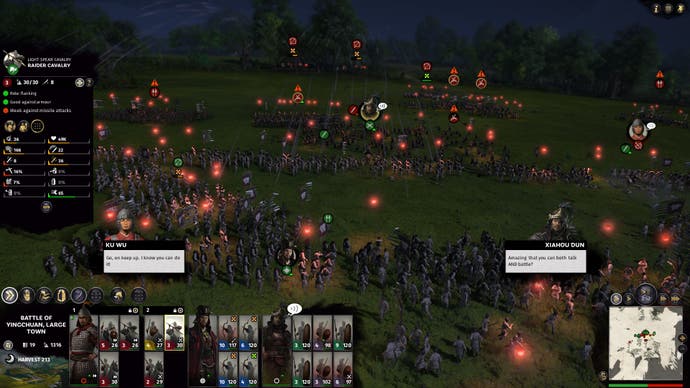
At times this can somewhat cloud your ability to make decisions, and sometimes it can simply overwhelm it. I often found myself dithering and fussing over getting my nicely colour-coded, complementary systems in line, when sometimes it just isn't quite worth it for a small percentage boost to population growth. In fact often it's detrimental, the Population, Food Supply, Public Opinion trifecta always in perpetual conflict and never in equilibrium. The effect of that, in particular, being too much time in the sub-menus of the overworld map, where buildings are all economy-focused in some way now that the availability of new troop types has been shifted to the tech tree entirely. Too much Total Commandery Taxation Levy Administrator and not enough Total War.
Where that ambition oversteps, then, is where it all begins to create a sense of intellectual fog, one that will probably layer itself over much of your first campaign, even if you're a seasoned player. There's often just one too many plates to spin, one too many Administrators to re-administer on the same task they just finished, one too many layers of systemic UI to dig through.
(Three Kingdoms has the regular UI layer, and then more tooltips on top if you hover over or right-click, and then if you press F1 there's a layer explaining what that lower layer of tooltips means, and then if you right-click on that there's another layer, taking you to a YouTube video explaining the entire system. It's too much. If your game needs four or five layers of meta-explanation for someone to understand a main, essential system like how food works, you've overdone it.)
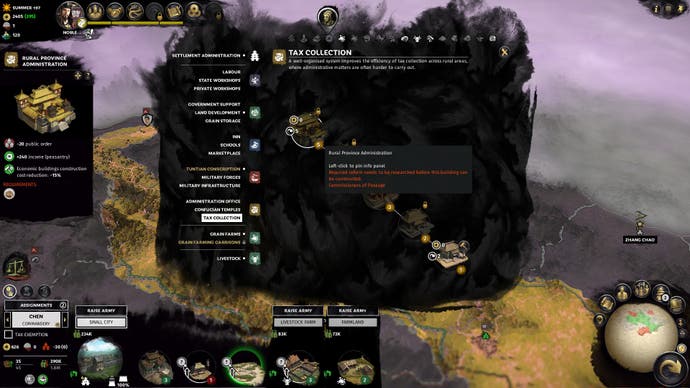
Total War: Three Kingdoms is Total War at its most bureaucratic, then, and next to the arcady-by-comparison Warhammer series no amount of extremely restrained Wushu battles between duelling generals can make up for that. Romance mode should really be the Records mode, and the reins should've been loosened just a tad more in art and systems alike for Romance.
And yet, that said, this is still the most ambitious Total War ever - by some way I think - and ambition is good. It's Creative Assembly's ambition that's led to Three Kingdoms finally reaching a more nuanced understanding of what it means to be historically accurate: that it's not just the literal accuracy of the whos and whats and whens, but the understanding of the why's of history, the narrative threads that run through it - and the awareness, in the perfect example of the Romance novel, that the story of history is often one we read onto the hard facts, instead of reading off them.
That step up in understanding is the greatest achievement with Total War: Three Kingdoms, and if it takes the odd bit of fuzz in the UI or obstruction of the fun for authenticity, so be it. Total War: Three Kingdoms is bureaucratic, obscure, dense and wickedly Machievellian if you have the appetite for it - but so was China in 190 CE, and I have genuine, sincere admiration for the way in which it's been captured.
